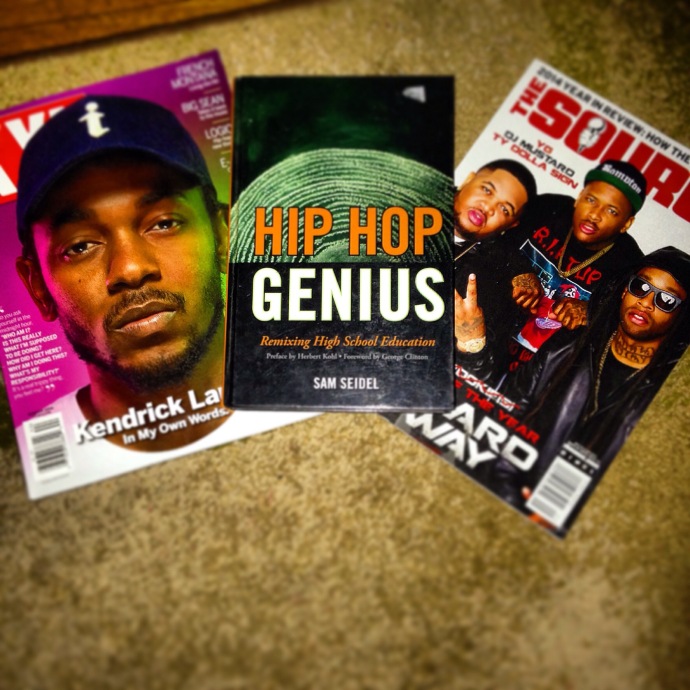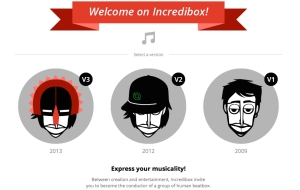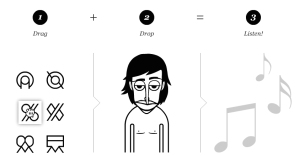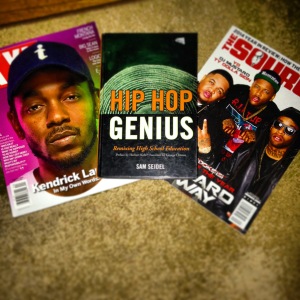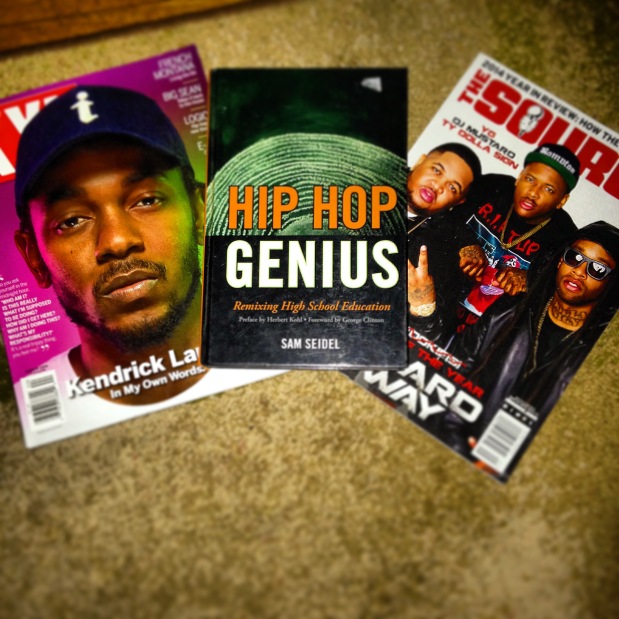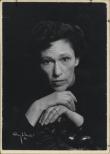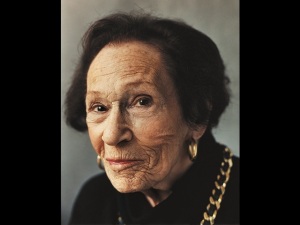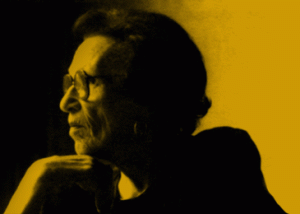#hiphopmusiced today is dedicated to learning more about the future of hip-hop. In the featured picture, you will see the tremendous variety of great emcees (musicians/lyricist) in whose hands lay the future of the culture. As a music educator, I am always looking to be able to recognize the contemporary in art. I endeavor to know the most I can about the current trends and artist of the culture. These are but a few of the great new update hip-hop artist shaping the direction of, and voicing the issues of the American experience. #kendricklamar #dejloaf #bigkrit #joeybadass #actionbronson #frankocean #jcole #hiphopfuture #hiphop







Category democracy
Teacher Orientation to Popular Music #HipHopMusicEd
#HipHopMusicEd
Music educators your lack of experience w/ and/or interest in popular American music limits not only your experience, but that of your students in the musicking classroom.
As I get older I am starting to understand that the only limits that exist in my classroom are those that I and my students create. I am currently researching the preferences and dispositions of preservice teachers and the education programs they are involved in. It’s important that we all understand that teacher orientation is typically dictated by teacher pedagogy and methods courses they are engaged during study. This is sets the foundation for what many teachers (professionals) will use as their teaching premise for the rest of their careers. The more limited, or shallow, these types of musical experiences that student-teachers have, the more likely they are to replicate them in their future teaching. This is evident in the limited selection of performance formats found throughout American music classrooms.
Teaching programs should in theory, be a place where student-teachers muddle through diverse experiences that are suppose (purposed) to help bring the unknown into the space of the known (Dewey). We have to stop replicating what we think is unequivocal permanent fact, and start trying to meet our students where they are and engage in relevant learning activities. Critical Hip-Hop Pedagogies are a wonderful set of approaches to bringing in relevance into the music classroom. Let’s help children find relevance in our classrooms by we ourselves, as teachers, tackling difficult topics with hip-hop pedagogies (practice, lens, bridge). Most teachers only replicate the experiences they have had in their learning experiences and rarely move outside of this paradigm. So, how do we repair this rigid range (limited) of experiences?
Let’s take the clarion call of such educators, ethnomusicologists and scholars like Adam Kruse, Barbara Lindquist, Randall Allsup, Lucy Green, and many others that ask us to question the familiar, and engage in a search of the practices of popular music and musicians. There is so much rich, diverse and important topics that can be uncovered in working with popular music. The first step is that teachers con not simply stay in the lane of practitioners, but have to also move into the lane of researcher. Practicing these popular forms of music can have deep benefits, and can help us gain so much through critical reflection. Students are worried about you being cool because you are authentic, they are in your class to learn and grow. They relate to you because of the level of honesty and how you share the ways in which you came to understand the topic. Reading a chapter and simply sharing this isn’t enough. Popular music forms have to be taught in various formats in undergraduate programs in order for change to happen. Let’s start now, to honor the great music of America. Let’s celebrate the J-Dilla’s, Stevie Wonder’s, Stephen Foster’s, Irving Berlin’s, Kanye West’s, Eminem’s, Katie Perry’s, James Brown’s, Johnny Cash’s, Wille Nelson’s, Louis Jordan’s, Miles Davis’, Wynton Marsalis’, Pete Seegers, and Kendrick Lamar’s of the music world. If we start with our teachers we can open up spaces of inquiry in our music classrooms that have never really existed before. Let’s tackle these forms, genres and topics.
How can we Enable Our Music Students (sans Instruments) #HipHopMusicEd #Incredibox
#HipHopMusicEd
As a teacher you’re always learning twice. As a music teacher pick music that allows for you to learn as well as your students. Take the Barbara Lindquist approach to ethnomusicological teaching of music. We teach the post hip-hop generation, why not think forward to tomorrow by using the music of today instead of the music of yesterday i.e. European Classical. Granted, study of that music has its merit and positive outcomes, BUT why that music, in this country, at this time? It’s 2015 and we still haven’t got the collective nerve to sit and analyze our, American, own music.. (Insert sad face). That’s why teachers learn twice, when they have to tackle the universal design of their lessons to help their entire class population, and the second time when they are overcoming their own bias in respect to the music. music teachers, take a stand and devote a couple of lessons to analyzing hip-hop music in your classroom, regardless of what type of class. Be brave and open up the canon. Do not worry about how authentic it is, do the research in respect to the beat producers and deejays. Don’t try to synthesize black culture (stereotypes) in your approach, even though it’s an important part. Just observe, pay respect to the ethos and the people that created it (urban minorities in the 1970’s). Replicate and analyze the music while making comments on topics/themes, musical elements, and truly studying what you and your students are working together on. Ask questions like; what do you see, what you hear, what does it mean to you. There is so much potential in the use and study of this music. The goal shouldn’t be to just make it an end, but rather to allow it to be a means as well.
#HipHopMusicEd #musiced #hiphopmusic #teacherasadvocate #socialjustice #hiphop
The Utility of Hip-Hop Music in Music Education #HipHopMusicEd
The Utility of Hip-Hop Music in Music Education #HipHopMusicEd
I really love hip-hop music, …no I REALLY love hip-hop music! I have loved it, the good and the bad, ever since I was about 11 years old and my mother bought me some Addidas high-tops like Run DMC, and took me to see “Tougher Than Leather”, a movie produce by Russell Simmons and that featured Run DMC (coincidentally, it was a great album as well.) So, I’ve been in love with hip-hop music for almost three decades. As a member of the hip-hop generation I am both a critic and advocate for the power of the music, and by proxy the culture. I’ve seen hip-hop grow into a multi-billion dollar industry that started off as a mechanism for expression and agency, out of the urban experience. I fell in love with music even earlier than I feel in love with hip-hop. I can remember going to the record store, yes the Record store, to pick up new music. See, my mother was and still is a lover of good music. So, I grew up listening to Stevie Wonders “Innervision”, all of Natalie Cole, the Ohio Player’s “Honey”and “Fire”, as well as all of EWF (Earth, Wind & Fire). I watched Casey Kasem “America’s Top 10” every Saturday when I would visit my grandmother’s sister Luella. I was and still am the Hip-Hop generation. My favorite hip-hop song of all time is “Stakes is High” by De La Soul, track produced by the dynamic genius of J-Dilla. I used to play in a hip-hop band in Chicago called H2O Soul, and we often opened up for the legendary hip-hop band, the Roots, Mos Def, and Common in Chicago, IL and Milwaukee, WI. I still make my own mixtapes (CD)of the hottest rappers out so that I can hear them in my car on either my iphone or my cd player. I am Hip-hop.
I have also been part of the conservatory method that was a huge part of the model used to design the American system of music education. I am a professional trumpet player (jazz) and I have two degrees in music performance, one a M.M. in jazz studies from Northern Illinois University (Go Huskies). But, the majority of my musical development and understanding, over the last twenty years, of what I feel real music, honest music, should be like comes from my time investigating hip-hop music on my own. Its these critical experiences in hip-hop, I believe, along with critical reflection that can and will help save American Music Education. I know that’s a bold statement, but there has to be something said about a musical genre that is global in nature. There are hip-hop cultures all over the world. Hip-hop exploded on the scene like a nuclear bomb, leaving radiation everywhere…affecting everything around the blast zone, whether it be lasting or temporary. The debates that have sprung from the addition of the music into the popular domain of culture is immense. The critical writing on the subject, in the “con” side, is a large number. However, there are a few examples of researchers calling for more investigation into hip-hop pedagogy. This groups use the music and culture as a device rather than a music making opportunity. These experiences in music that we are talking about would be called “Musicking” by the late ethnomusicologist, Chris Small. Daily we all are bathed is sound, and music in its essence, is sound. Why must we be masters in order to craft something? That’s a horrible thought, to believe that in order to take part in something you can only do so if you are the master of it. You can never contribute, or feel value until you have truly mastered it, correct? I disagree with this sentiment and believe hip-hop music’s development has helped music endure in the America of the 21st century. It helped the music industry sustain over the last two decades. It has revitalized the way we share music and how often we can do it. Hip-hop was child along with the internet, synthesizers and cable, and the little brother to Funk, Punk and Disco. Hip-hop was raised on a diet of Reganomics, budgetary cuts in Arts Education, the Crack Explosion, and the AIDS epidemic of the early 1980’s. What a dynamic time in the world, and more specifically the United States of America.
So, I believe this dynamism that Hip-hop, the music of the Urban America experience, encountered during that time makes it a suitable and relevant bridge, lens and practice – framework, in which to work in. Music education is behind the eight ball and needs to look deeply in itself to find the big why(s)? Why do we teach? Why do we need to teach that? Why isn’t Hip-Hop music part of the canon? Why are we afraid to use hip-hop as more than a tool? Why aren’t we treating it as a subject – space of inquiry? These questions can be very difficult to answer, for some. Hip-Hop is relevant for the millions of people that are part of the post-hip hop generation. Hip-hop, for them, has always been a part of their lives and they can’t remember a time when there wasn’t hip-hop music or culture seen all around them. They can’t think of a time before rap, or when there wasn’t graffiti somewhere, or when deejays didn’t mix records without the use of a crossfader? Hip-hop is S.T.E.A.M.. If you really want to be real about it. Its the place where technology, society (culture), and music collide (imbricate) creating a beautiful consequence. If you want to relate to this generation of people, as a music educator, you will have to overcome your fear of messing it up (experience) or not doing it authentically (realness), and truly investigate the music (black urban culture). Music education programs will have to accept change and include new things into their pedagogies on pedagogy(instruction). I advocate for change, not massive and devastating change, but dynamic change nonetheless.
The use of hip-hop music in American music education is useful, practical and relevant. The utility of hip-hop music in music education is tremendous. Its both an “end” and a “mean” and that spells out a win win for all educators. Hip-hop has an aesthetic deeply grounded in ethnographic dislocating, de-centering and disrupting what we value and what our values are. The music can be analyze by theoretician, historian and educational teachers in three different perspectives; “Hip-hop as Bridge”, “Hip-hop as Lens” and “Hip-hop as Practice” (Kruse, 2014). These delicate yet flexible frameworks, through which we can use and engage with the space of inquiry that hip-hop creates, are important to recognize prior to delineating our curriculum. In order to create lasting change we must first get teachers, students, administrators and the public at large to understand that music is sound, and hip-hop in its purest form is sound appropriation. Its similar to the renown work of appropriation artist Elaine Sturtevant (Check out the MoMA – Double Trouble) did in the late nineteen-seventies from works centered on Jasper Johns, Andy Warhol, and Jackson Pollack. Hip-hop helps people combat and face their biggest prejudices by allowing an open debate between lyricist, deejays, graffiti artist, breakdancers and the audience to be had, about topics including but not limited to; freedom, identity, democracy, police brutality, violence in urban areas, racism, sexism, peace, victory and a wide array of other themes. Its a great introduction for music students interested in composition to learn about building motifs and motives. Its a perfect way to teach patience and what a groove is (Ostinato). It allows the teacher to deal with timbre and sonority, two of the most difficult topics in music education. Teachers can use the music to explore ethnomusicological approach to getting their students to learn more about the culture of America, history of our country and the various factors that contribute to our place in the world. Hip-hop helps people (that participate with it) to write their own worlds (story) in a more accessible ways than most other musical genres. Its accessible, and teachers need to know that the only thing between hip-hop music and them, is really only them and their preconceived notions about the culture and music(BAM). I prefer that the academy take a look at the programs all around the country that would benefit from culturally relevant music education, and simply attempt to expand the canon. Include a couple of famous hip-hop tunes as evidence of a willingness to engage with others about our path. Sometimes we as teachers (educators) forget that we are not in a fight with society or culture(people), but rather we are in a war with the thoughts and ideas that pollute our minds and those of the masses.
As I spoke earlier about “de-centering” “dislocating” and “disrupting” our thinking or ideological sediment, hip-hop music is great at doing that. Democracy demands controversy (Hess 2009). So, what other music has caused as much controversy as hip-hop? Lets use this space of inquiry as an opportunity to get teacher and student using discussion as a way of learning. To share is at the heart of the arts, and the vehicle of the aesthetic. Democracy is but a frame about which we demand to contribute our voices, but their must still be a system put in place to make sure everyone is heard. I am not suggesting that we simply change all of the literature and repertoire lists that exist in American Music Education, but that we simply expand it in order to make needed room for all American music genres. They all deserve to be valued as product, artifact, space of inquiry, movement, culture, etc. As American changes, demographically, so should the things that we value. We should start seeing more elements of the minority view present in the privileged position, because the Eurocentric values of our forefathers are antiquated and have never really represented the entirety of the American populous.
So, what I will be doing over the next couple of years, is build a case for a space for hip-hop music in music education. I hope you will join me, because will be writing about curriculum, instruction and uses of hip-hop pedagogy in the domain of the music classroom. I hope you will engage with me in this journey and feel free to comment and ask questions. I will post the link to my blog on #twitter #instagram and #facebook using the hashtag #hiphopmusiced
Sincerely,
Jarritt A Sheel
#hiphopmusiced #hiphopmusiceducation #hiphoped #hiphoppedagogy #hiphop #Music #MusicEducation
I Love You Dr Maxine Greene
Maxine you will remain on my mind and on my heart for the rest of my life. Thank you for the many moments you shared with me. Your intellect, bravery, courage and elasticity to any situation presented to you is a real testament to what is needed and is good in mankind. I will miss you dearly. Maxine, I love you…
“There are no final words, but only questions.” – Maxine Greene
TRIBUTE TO MAXINE….
“[O]f all our cognitive capacities, imagination is the one that permits us to give credence to alternative realities. It allows us to break with the taken for granted, to set aside familiar distinctions and definitions” (p. 3). – Maxine Greene
During this recent spring semester (2014) Teachers College, Columbia University I had the fantastic opportunity to take a course from Dr Maxine Greene. This experience truly changed my life forever. My time with Maxine helped change the why I imagine the world and my place in it. Her attitude is amazing, and I truly love her incredible curiosity for the varieties of freedom that exist in the world. She has become my intellectual mentor. Her positive comments have helped me be braver and sure of the direction that I am traveling in. Her works, “The Dialectic of Freedom” as well as “Releasing the Imagination” have given me tremendous amounts of reflective material to build my understanding of freedom, power and the connection that the imagination has to it. She and Stephen D. Brookfield have given me an insight into critical pedagogy and its place in current education.
Aesthetic experience is tremendous! Thanks Maxine for allowing me into your home and sharing your thoughts with me. I love you and admire your courage. I hope that I will be half as productive and courageous as you!
Maxine Greene (born December 23, 1917) is an American educational philosopher, author, social activist, and teacher.
American educational philosopher, author, social activist and teacher who values experiential learning in its “entirety”, Maxine Greene has influenced thousands of educators to bring the vitality of the arts to teachers and children.[citation needed] For Greene, art provided a conduit to mean-making, a way of making sense of the world. For more than 30 years she has been Lincoln Center Institute (LCI)[1] philosopher-in-residence.
Greene earned her PhD. (1955) and M.A. (1949) from New York University and a B.A. from Barnard College, Columbia University (1938). She taught at New York University,Montclair State College and Brooklyn College. In 1965, she joined the faculty at Teachers College, Columbia University.[2]
In 1973 she was one of the signers of the Humanist Manifesto II.[3] As Philosopher-in-Residence of Lincoln Center Institute for the Arts in Education since 1976, Greene conducts workshops (especially in literature as art) and lectures at LCI’s summer sessions.[4]
In 2003, she founded the Maxine Greene Foundation for Social Imagination, the Arts, and Education.[5] The foundation supports the creation and appreciation of works that embody fresh social visions. Its goal is “to generate inquiry, imagination and the creation of art works by diverse people.”[6] Grants of up to $10,000 are awarded to educators and artists.
In 2005, she inspired the creation for the High School of Arts, Imagination and Inquiry[7] in association with LCI and New Visions for Public Schools.[8][9] The school encourages students to expand their imaginative capacities in the arts and other subject areas.
Greene is past President of the American Educational Research Association (AERA), Philosophy of Education Society, American Educational Studies Association (AESA), and theMiddle Atlantic States Philosophy of Education Society.
She is the recipient of honorary degrees in the Humanities from Lehigh University, Hofstra University, the University of Colorado at Denver, Indiana University, Goddard College,Bank Street College, Nazareth College (Rochester, New York), McGill University, College Misericordia, and Binghamton University.
She was awarded the Medal of Honor from Teachers College and Barnard College; Educator of the Year Award from Phi Delta Kappa; the Scholarly Achievement Award from Barnard College; AERA’s Lifetime Achievement Award; and received a Fulbright Program fellowship, which took her to New Zealand.
In 2004, the Teachers College Trustees created the Maxine Greene Chair for Distinguished Contributions to Education.
Major works:
- The public school and the private vision : a search for America in education and literature (New York : Random House, 1965)
- Critical Literacy: Politics, Praxis, and the Postmodern (State University of New York, 1993)
- Existential Encounters for Teachers (Random House, 1967)
- The Dialectic of Freedom (Teacher’s College Press, 1988)[10]
- Landscapes of Learning (Teacher’s College Press, 1978)[11]
- A Light in Dark Times: Maxine Greene and the Unfinished Conversation, with William Ayers & Janet L. Miller (Teachers College Press, 1997)[12]
- The Public School and the Private Vision: A Search for America in Education and Literature (Jossey Bass Publishers, 1965)[13]
- Teacher as Stranger: Educational Philosophy for the Modern Age (Wadsworth Publishing, 1973)
- Variations on a Blue Guitar: The Lincoln Center Institute Lectures on Aesthetic Education (Teacher’s College Press, 2001)[14]
- Releasing the Imagination: Essays on Education, the Arts, and Social Change (National Association of Independent Schools, 2004)[15]
Other important works include:
- Arts and the Search for Social Justice (Lecture at The Maxine Greene Foundation for Social Imagination, The Arts & Education, 2003)
- Active Learning and Aesthetic Encounters (Talks at the Lincoln Center Institute, National Center for Reconstructing Education, Schools and Teaching, 1994)
- Education, Freedom and Possibility (Russell Lecture, 1975)
- Lending the Work your Life: A Celebration with Maxine Greene (Lincoln Center Institute, 2006)[16]
- Naturalist-humanism in eighteenth century England: An Essay in the Sociology of Knowledge (Thesis, 1956)
- A Teacher Talks to Teachers: Perspectives on the Lincoln Center Institute (Lincoln Center, 1980)
What is Hip Hop Pedagogy?
As a current graduate student in the Music & Music Education program at Teachers College, Columbia University I have decided to write frequently and persuasively about Hip Hop Pedagogy in the domain of music education. My name is Jarritt A Sheel and I am currently a Ed.D. student in the Music & Music Education program at Teachers College, Columbia University. I am an avid fan of hip-hop music and hip-hop culture, a professional musician (trumpet), I lead a jazz big band, and I have been a music educator for the past 15 years. I am throughly enamored by all art forms, but specifically the medium sound we call Music.
As a child I was pretty lucky to grow up during the period leading up and encompassing what many consider the “Golden Age of Hip -Hop”, the period of the late 1980’s until the mid-1990’s. My mother was born in the 1950’s, which meant she was a member of the baby-boomer generation, post WWII. She grew up listening to all sorts of Rock, Blues, Funk, Soul, etc. You name it, it was on the radio and she probably had a copy of that record in her collection. She introduced me to the world of music and more importantly fostered my curiosity about the then expanding field of hip-hop music. She bought me a RUN DMC record and took me to see, although we both didn’t know what it was about, “Tougher Than Leather”. After bout 30 minutes of this early hip-hop movie featuring RUN DMC, The Beastie Boyz and many other Def Jam label artist, we exited stage left… because I was merely 12 years old. However, she sparked within me the love for controversial art and more importantly that of Hip-Hop.
Hip Hop is an original art culture that rose out of the metropolis of New York City, specifically the Bronx, in the 1970’s. It is an American folk music that has traditions, like all American Folk, in telling the story of the people. A matter of fact I would go as far as saying that Hip Hop is the greatest of all American Folk musics. It is wonderful, sublime, hideous, grotesque, lustful, beautiful, ugly, mournful, celebratory, liberating, and oppressive all at the same time. The time period out of which hip-hop grew, the 1970’s, was a particularly frustrating time in America for the middle and lower socio-economic groups in the area of finance and social mobility. Introduce the 1973 oil crisis, Urban Decay, and the financial meltdown of one of the biggest cities in the nation (looming financial default of New York City late 1970’s) and you have a potent cocktail for failure amongst those living near, on or below the poverty line.
The 1970’s was all ready an interesting time of contraction and expansion. The nation was expanding its identity while those involved in social-economic engineering, outside of academia, were looking at the contraction of the wealthy through the monopolization of the free market. A great example of that would be the movie “Trading Places” starring young Eddie Murphy and Dan Ackryod. Which loosely discusses, through comedic foils, the intentional and systematic engineering of the socio-economic structure in America. The Bronx was burning and the music, like art always does, told the story. These are the lyrics of the early hip-hop group Grand Master Flash and the Furious Five hit “The Message”
[Intro x2]
It’s like a jungle sometimes
It makes me wonder how I keep from goin’ under
[Verse 1]
Broken glass everywhere
People pissin’ on the stairs, you know they just don’t care
I can’t take the smell, can’t take the noise
Got no money to move out, I guess I got no choice
Rats in the front room, roaches in the back
Junkies in the alley with a baseball bat
I tried to get away but I couldn’t get far
Cause a man with a tow truck repossessed my car
[Hook]
Don’t push me cause I’m close to the edge
I’m trying not to lose my head
It’s like a jungle sometimes
It makes me wonder how I keep from going under
[Verse 2]
Standin’ on the front stoop hangin’ out the window
Watchin’ all the cars go by, roarin’ as the breezes blow
Crazy lady, livin’ in a bag
Eatin’ outta garbage pails, used to be a fag hag
Said she’ll dance the tango, skip the light fandango
A Zircon princess seemed to lost her senses
Down at the peep show watchin’ all the creeps
So she can tell her stories to the girls back home
She went to the city and got so so seditty
She had to get a pimp, she couldn’t make it on her own
[Hook]
[Verse 3]
My brother’s doin’ bad, stole my mother’s TV
Says she watches too much, it’s just not healthy
All My Children in the daytime, Dallas at night
Can’t even see the game or the Sugar Ray fight
The bill collectors, they ring my phone
And scare my wife when I’m not home
Got a bum education, double-digit inflation
Can’t take the train to the job, there’s a strike at the station
Neon King Kong standin’ on my back
Can’t stop to turn around, broke my sacroiliac
A mid-range migraine, cancered membrane
Sometimes I think I’m goin’ insane
I swear I might hijack a plane!
[Hook]
[Verse 4]
My son said, Daddy, I don’t wanna go to school
Cause the teacher’s a jerk, he must think I’m a fool
And all the kids smoke reefer, I think it’d be cheaper
If I just got a job, learned to be a street sweeper
Or dance to the beat, shuffle my feet
Wear a shirt and tie and run with the creeps
Cause it’s all about money, ain’t a damn thing funny
You got to have a con in this land of milk and honey
They pushed that girl in front of the train
Took her to the doctor, sewed her arm on again
Stabbed that man right in his heart
Gave him a transplant for a brand new start
I can’t walk through the park cause it’s crazy after dark
Keep my hand on my gun cause they got me on the run
I feel like a outlaw, broke my last glass jaw
Hear them say “You want some more?”
Livin’ on a see-saw
[Hook]
[Verse 5]
A child is born with no state of mind
Blind to the ways of mankind
God is smilin’ on you but he’s frownin’ too
Because only God knows what you’ll go through
You’ll grow in the ghetto livin’ second-rate
And your eyes will sing a song called deep hate
The places you play and where you stay
Looks like one great big alleyway
You’ll admire all the number-book takers
Thugs, pimps and pushers and the big money-makers
Drivin’ big cars, spendin’ twenties and tens
And you’ll wanna grow up to be just like them, huh
Smugglers, scramblers, burglars, gamblers
Pickpocket peddlers, even panhandlers
You say “I’m cool, huh, I’m no fool”
But then you wind up droppin’ outta high school
Now you’re unemployed, all null and void
Walkin’ round like you’re Pretty Boy Floyd
Turned stick-up kid, but look what you done did
Got sent up for a eight-year bid
Now your manhood is took and you’re a Maytag
Spend the next two years as a undercover fag
Bein’ used and abused to serve like hell
Til one day, you was found hung dead in the cell
It was plain to see that your life was lost
You was cold and your body swung back and forth
But now your eyes sing the sad, sad song
Of how you lived so fast and died so young so
[Hook]
This great work of Hip Hop Culture was a signal of the disparity that existed amongst the haves and have-nots here in NYC. It is still apparent where the disparity existed over 40 years ago. Those lines of stratification (scars) can still be seen on the geography – travel ways of NYC (bus, train, road, subway). It can be seen in the topography of the Bronx. It can be most distinctly heard on the music of the era and the area. I was forever changed by hip-hop music and the culture coming out of NYC in the 1980’s through the 1990’s as a young person. It continued in my adult life through the far-reaching effects of the dissemination of hip-hop culture in my community through people like Uncle Luke, 2 Live Crew, jam Pony Express, Dj Uncle Al, and the list goes on. But one thing remain, the fact that it was a folk music, and illegal to be played on most radio stations. It was the voice of the youth and the changing culture here in America. It was, like the above transcribed lyrics of that famous piece “The Message” a polaroid of the climatic time period in which it was created. This Polaroid is a reflection of the critical thinking that was happening during that time period. It is my assertion that Hip Hop Culture is not only an artistic expression of the counterculture in NYC during the 1970- 1990’s but more importantly it is a critical reflection of American culture. In critical theory terms, it helped a whole generation estrange themselves from the ideological sediment of the time.
SO, WHAT IS HIP HOP PEDAGOGY?
Pedagogy: the method and practice of teaching, esp. as an academic subject or theoretical concept.
To be involved in a Hip Hop Pedagogy is to welcome an invitation into the shared reality of those that are participants in it. It is to enable all of its inhabitants with the tools and choice to intervene in the transformation of their world. It is a solicitation to become more involved in democratic debate about the state of our society, culture, country and community on multiple layers and perspectives. The discourse of power and freedom inherent in the subject of Hip-Hop culture is something that should be readily used in the instruction of the student. Typically, it’s the student’s want and need to develop a deeper understanding of the world and their place in it. The culture begs for the participant to share their voice in the debate. The history of Hip-Hop is one of controversy and crisis wrapped up in a palatable feast of beats & lyrics served on top of a plate of graffiti. The accompanying libation is a dark burgundy one named “Chateau de Breaking; popping and locking”, which is served in a wineglass constructed of community activism and multicultural advocacy (critical race theory).
So, what does Hip-Hop pedagogy look like? It is a contemporary form of democratic education, which invites heavy student involvement in the construction of the classroom and the lesson (Brooks & Brooks). It advocates for the whole development of the student as total human being, rather than simply as a citizen or participant. It evokes the development of the self and more specifically the individual’s voice. Hip-Hop is not merely the music of a specific ethnic or socio-economic group. It is a culture that developed, like many in American history out of the crisis, conflict and controversy of the time. More importantly it is a discourse that is centered on the concepts of power and freedom, and is inclusive of the educative process we call life.
Classes & courses that are developed in the domain of Hip-Hop pedagogy should make the participants question their surroundings, situatedness, and circumstances. Hip-Hop pedagogy should also be a multilayered approach. It is one that engages students where they are and uses a variety of the elements found in the culture to proctor aesthetic experiences for and in the participants (disruptions). Hip-Hop pedagogy is a circuit that connects teacher & student, citizen & community and society & culture to one another. This circuit allows for the exchange of ideas and understandings, with the goal of joint meaning making to happen. It is elastic and flexible with a structure that is informed by the past (traditions), but bound only by the imagination.
Hip Hop Pedagogy should help immerse the participants in awareness in all of the various tenses that they exist (Past, present & Future). Past tense shall be defined as the critical reflection, Present tense is the acute awareness of “Now” and the Future tense is that of the ever evolving imagination of “What If.” These three tenses are all important in the development of the totality of the humanism that we all have. It’s not simply a means to end, or an end unto itself, but is more radically involved in the process of ever becoming more than before. Hip -Hop Pedagogy is a critical take on multiple openings and entry points contained in a relevant wrapper.
Hip-Hop is in its essential and rawest form, uses the power of the imagination. It takes place in the virtual space of the mind for those that implore it to express the lived world experiences that they’ve engaged in. Hip-Hop is dance, clothing, speech, literature, visual art, code & symbol, music, and everyday life. It is a way of living like those of jazz, country, rock, folk, punk, funk, soul and a whole myriad of other musical cultures that sprung up from the well-spring of America culture. Each of which have its own unique style of life.
Hip-Hop pedagogy should be centered on the concepts of agency, activism, and democracy, open spaces, open encounters, inclusion, lived worlds and shared realities. The lyrics of some of the finest hip-hop songs speak eloquently about the lived experiences (worlds) of those involved. They (songs) talk about socio-economic disparity in society and the discourse(s) of power and freedom. Hip-hop pedagogy is about creating an exchange in various forms on multiplicity of levels. The art of Banksy and Lee Quinone’s, the beats of J- Dilla and MF Doom, the lyrics of Rakim and Drake all speak for and about those in a similar group of society, or is it that they speak for every man? Everything that is folk (counterculture) ultimately becomes part of the popular. That point speaks to the cyclical nature of the various discourses involved in hip-hop culture and more specifically hip-hop pedagogy. It’s about the turning over of the traditional to make way for the innovation (R. Barthes). It’s about allowing the student the opportunity to be involved in crafting their understanding of the world around them while giving them voice.
How can we use Hip Hop Pedagogy, which I will help flush out the literature in future post – scholarship, in the domain of Music Education? Well, there lies the rub. American Music Education, that dubious character, first has to acknowledge Hip-Hop as a musical form worthy of study. Then and only then can we actively … as a whole use hip-hop pedagogy as a integrated part of music education in our classrooms. Let me clarify right now, there are band directors and art educators that have been and are currently using hip hop pedagogy in their classrooms and studio environments, all over American and furthermore .. the world. However, it is not currently accepted as a valid form or music or culture by academia and the aesthetic police. The aesthetic police are those that assert themselves to the grand title of judge of which aesthetic experiences as well as how they “should be” used in the context of learning. They are rarely correct, and even when they are …typically use this opportunity to pontificate about their rightness. We see this every week on the various news outlets, and can only surmise that this type of policing has been going on for sometime in culture..period.
So, if we are to have a through discussion on the use of Hip Hop Pedagogy in the Music Classroom… we must first start with the unpacking of the music’s validity. We must say that Hip Hop is real music and it is worthy of study in major universities and music programs. We also have to give room and space for all other forms of American folk, but that discussion can be tabled until another time soon coming.
I hope you enjoyed this first rant on the Hip Hop Pedagogy and Music Education. I will try my best to write as often and eloquently as I possibly can to showcase the need to talk about the power, effectiveness as well as the need for such programing.
-Best
Jarritt A Sheel

